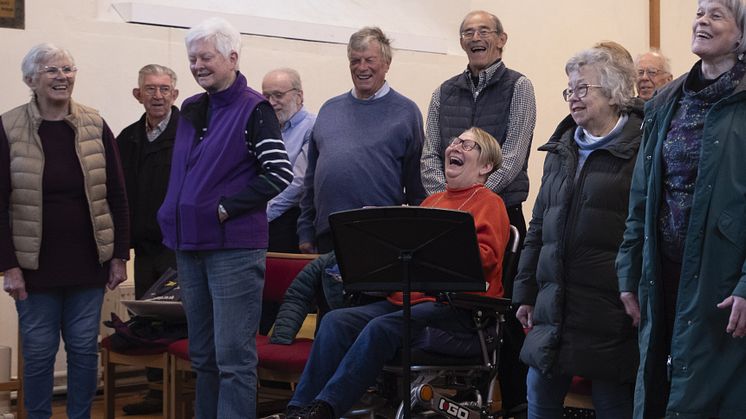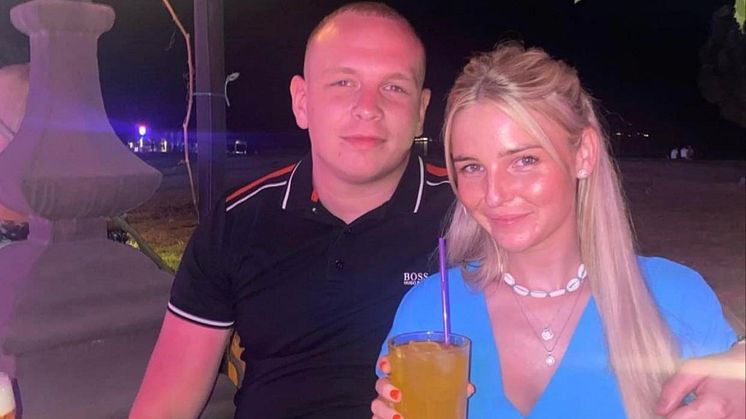
Press release -
Chartham woman’s passion for music and singing helps to rebuild her life after a stroke
A Chartham woman’s passion for music and singing helps to rebuild her life after a stroke while on holiday in Italy.
Jeannie Williams, 66, had recently retired as an Early Years lecturer and Special Educational Needs teacher and was loving her new life. She played in two recorder groups, sang in a church choir and performed folk music with her guitarist husband, Chris.
In May 2022, Jeannie had a bleed on the brain which completely changed her life. Initially faced with severe right-sided weakness in her leg and arm, which meant she could not play her instruments, and communication difficulties which affected her speech and singing – Jeannie felt herself slipping into depression.
With support from good friends, her local community and the Stroke Association, Jeannie has managed to recover and adapt to life post-stroke amazingly.
Now part of a community wellbeing choir and playing a one-handed recorder, Jeannie is backing the Stroke Association this Stroke Awareness Month to raise awareness of the condition and the benefits of music and singing for survivors.
Jeannie said: “Singing has always been my thing – I’ve loved it since I was a little girl. As an adult, I would just go for a walk into the middle of nowhere and sing my heart out.
“After my stroke, I was completely paralysed down one side of my body. I couldn’t walk or talk properly and doing anything independently was difficult - I couldn’t go to the toilet, stand up or open a water bottle by myself. Losing singing and music nearly killed me - I just can’t be myself without them. If it wasn’t for my recorder group and my good friend Emily, who runs a choir, I don’t know where I’d be now.”
Jeannie spent two weeks in an Italian hospital when she had her stroke. With limited visiting hours due to Covid-19 restrictions, she says that singing helped her through this tough time.
Jeannie said: “I remember feeling so bored one day that I sat up in bed and tried to sing. My voice was croaky, my mouth was numb, and my speech was slurred. I reassured myself that I didn’t know anybody on the ward and no-one spoke English anyway, so it didn’t matter what I sounded like!
“Singing meant I could hold onto a part of the old me. It was something I could do by myself, for myself.”
Jeannie was eventually repatriated home - wheelchair-bound, unable to go outside and extremely fatigued, the physical impact of her stroke started to sink in. Members of her recorder group rallied around to help as much as they could.
She said: “A meal rota was set up by friends from the village. The house was always full of people popping in with food shopping or offering to help with my physiotherapy exercises.
“One member, a former nurse, visited me soon after I got home when I was in bed and unable to move. She washed my hair, cut my nails, held my hand and spent time talking to me. After a hectic and horrible experience in Italy, it felt utterly amazing. After a few weeks the group met at my house and they would sit around my bed.”
As time went on, Jeannie’s confidence grew, and an online search found someone who converted recorders to enable one-handed playing. Jeannie still had reservations about singing but was persuaded to join her friend Emily Renshawe-Kidd’s community wellbeing choir, the Charlton Larks.
Jeannie said: “Emily kept insisting that I give her choir a go and I kept saying that I couldn’t sing properly anymore. My voice got tired from talking let alone singing. I lost a lot of confidence too - you feel very vulnerable after a stroke.”
“Emily sent me a research article looking at brain scans and how singing can make a difference to people after stroke. I thought I’d just give it a go, and I am so glad I did. The choir gave me a good reason to leave the house regularly.
“The first time I went, I fell asleep in my wheelchair after half an hour. It was a tiring but brilliant experience. Gradually, I could do more without feeling fatigued, and my voice got stronger and more reliable. Singing in the choir has made a huge difference to my life. It has given me motivation to keep trying to get better.”
Emily is the Artistic Director of the Canterbury Cantata Trust, a registered charity that runs, supports and funds local singing groups. She said: “It has been amazing to see the difference in Jeannie, it’s beyond description. After her stroke, her mood was very low, her speech was impaired, and she thought she’d never sing again.
“After just a few sessions with the choir, her speech was clearer, she was more confident in herself, and her lovely singing voice returned. Jeannie is just one example of many people I’ve met who struggled to speak but could sing instead - the brain is incredible.”
In June 2022, a friend suggested that Jeannie contact the Stroke Association for additional support, and she reached out to the charity’s East Kent Stroke Recovery Service.
Local stroke support coordinators work with stroke survivors to identify personal support needs, offer opportunities to increase independence and help rebuild their lives after stroke.
Jeannie said: “Jacqui, my Support Coordinator, has been brilliant - I email her and she replies within minutes. She gave me information on equipment and practical tips for managing at home. She also put me in touch with a local stroke support group. Meeting other stroke survivors helped me begin to accept my disabilities!”
Peer support, music and singing have all given Jeannie a renewed sense of purpose as she works towards her recovery goals.
She said: “Even though half of my body doesn’t work, I am still the same person I was before the stroke. I’m looking forward to doing our termly choir performance for family and friends. We have a drink, cake and a laugh.”
May is Stroke Awareness Month, and the Stroke Association is encouraging people to raise their voice to help stroke survivors get the vital support they need after the devastating impact of a stroke. The charity has launched Sing4Stroke, a new fundraising initiative where people can sing wherever they like - at home, on a live stream, at the office, at school or organise their own event - to raise vital funds to support stroke survivors and their families.
Nick O’Donohue, the Stroke Association’s associate director for the South East, said: “By raising your voice for stroke survivors this May, you can help stroke survivors like Jeannie and their loved ones to find strength through support.
“We’re so pleased that she found the support from our East Kent Stroke Recovery Service so helpful.”
Sign up to Sing4Stroke at www.stroke.org.uk/singing
Topics
Categories
Regions
Over 90,000 people survive a stroke every year in the UK, but surviving a stroke is just the start of a long and traumatic battle to finding their way back to life.
The Stroke Association is the only charity in the UK providing life-long support for all stroke survivors and their families. We provide tailored support to tens of thousands of stroke survivors each year, fund vital scientific research, and campaign to bring the best care and support for everyone affected by stroke.
Anyone affected by stroke can visit stroke.org.uk or call our dedicated Stroke Support Helpline on 0303 3033 100 for information, guidance or a chat when times are tough.


